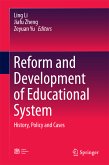This book presents policy debate and analysis of educational reform context, process, and capacity - mainly in Southeast Asian countries - and calls for a new political economy of educational reforms and capacity development. The conceptual/analytical framework addresses both the efficiency and equity dimensions of educational reforms; encompasses all the stakeholders in the process of educational reforms; and suggests whose capacity needs to be developed. Country cases, targeting Cambodia, Laos and Vietnam and featuring Southeast Asia/country experts as contributors, offer in-depth analyses of the dynamics of educational reform context, process and capacity, and examine efficiency, equity, and quality issues in basic and higher education.
This book is a highly relevant source of information for education policy makers and planners, and will help researchers to understand the innovative way to analyse educational reforms and capacity development in developing countries.
Dieser Download kann aus rechtlichen Gründen nur mit Rechnungsadresse in A, B, BG, CY, CZ, D, DK, EW, E, FIN, F, GR, HR, H, IRL, I, LT, L, LR, M, NL, PL, P, R, S, SLO, SK ausgeliefert werden.









